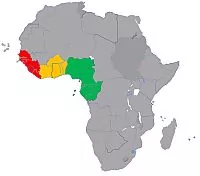There has been no major disruption to oil output in the Niger Delta in 2017, thanks to a ceasefire in late 2016 resulting from peace talks between the federal government and local leaders. The stability and upsurge in oil revenue is helping the government deal with the struggling economy and pursue budget targets, but what is the outlook?
Main Findings
- The Nigerian government derives about 70% of its revenue from petrodollars, and so the slump in global oil prices and militant disruptions at home in the Niger Delta especially undercut the government's finances in 2016. In February that year, a new militant group named the Niger Delta Avengers (NDA) first attacked a Forcados terminal belonging to US oil firm Shell, with the firm declaring a force majeure on the terminal. This shaved about 300,000 barrels per day (bpd) off the country's output, and the NDA went on to spearhead further attacks that year that effectively reduced national output from 2.1 million bpd in January to 1.4 million bpd in August. [KA1] The economy tumbled because of the country's dependence on oil exports, and by the end of the year, the year-long recession was at -1.3%.
- The government initially tried to curb the militancy with a carrot-and-stick approach, holding peace talks with local leaders while troops raided restive communities. But the success of this approach was minimal as disaffection persisted in the region. In August, regional leaders such as Chief Edwin Clark and Delta State Governor Ifeanyi Okowa formed the Pan Niger Delta Forum (PANDEF) to mediate in the conflict, and this proved to be the game-changer. The NDA militants, who had claimed to want a greater share of Nigeria's oil wealth to go to the region, endorsed the mediators. Given this mandate, the mediators eventually met President Muhammadu Buhari in October with a list of 16 requests (including a withdrawal of troops) and a ceasefire was agreed.
- Oil firms in the region ramped up operations in the post-ceasefire period. Shell, for instance, reopened its Forcados terminal in October after completing repairs. The government has also consolidated gains in cooperation with local stakeholders despite President Buhari's absence from the country for seven weeks from January 2017 on prolonged sick leave in the UK. Vice President Yemi Osinbajo has been leading the engagement, most recently meeting stakeholders to prepare a template for the setup of modular refineries to replace illegal refineries in the region. Today, the region is significantly stable, oil output has climbed back to 2.2 million bpd, and the government appears to be pursuing economic recovery (e.g. defending the currency and revamping infrastructure) with renewed vigour.
Outlook
The present stability in the Niger Delta remains fragile, but it
looks sustainable given the relatively healthier relationship
between the federal government and local stakeholders. We expect
peace talks will be sustained and that the present government will
maintain efforts to address the region's needs in conjunction
with stakeholders on the ground. Reports from sources on the ground
suggest that corruption investigations affecting top politicians
from the region may be temporarily muted to pave way for more
cooperation.
President Muhammadu Buhari recently launched a 2017-2020 economy
recovery and growth plan (ERGP) that ultimately targets
single-digit inflation, real GDP growth of 7% and an oil output of
2.5 million bpd by 2020. Given the significant role that oil
revenue plays in the economy, a return to normalcy in the Niger
Delta will clearly reflect positively on the investment climate and
will help to steer the country towards the attainment of goals laid
out under the ERGP. However, risks still remain with Nigeria's
exposure to changes in global oil prices, and from a security
perspective, the various stakeholders who are delicately holding
together the relative stability in the Niger Delta will be under
pressure to maintain the balance and keep the peace.
The content of this article is intended to provide a general guide to the subject matter. Specialist advice should be sought about your specific circumstances.

